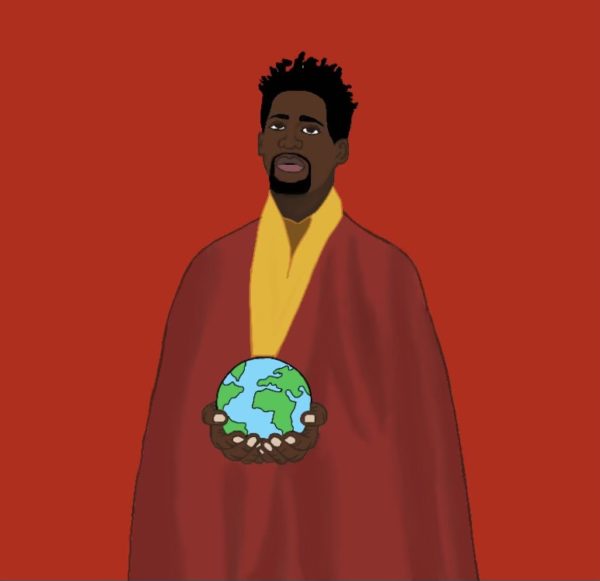
After his quintuple Grammy Awards win last year — a feat that involved beating chart toppers like Billie Eilish, Olivia Rodrigo and Taylor Swift for the Album of the Year — Jon Batiste was essentially given a green light. His acceleration was rapid; he went from Stephen Colbert’s grinning bandleader to an artist at the upper levels of the pop stratosphere and a household name almost instantly.
This August, Batiste released his newest project, “World Music Radio,” an ambitious concept album with a gumbo of global stars, sounds and symbolisms. Featured on the album are such diverse artists as the K-pop group NewJeans, New Orleans-born rapper Lil Wayne, saxophonist Kenny G and the familiar favorite Lana Del Rey.
Batiste has often been hailed as an undefinable, genre-bending artist backed by considerable musical chops — he comes from a lineage of musicians and is a graduate of the prestigious jazz programs of the New Orleans Center for the Creative Arts and The Juilliard School — but “World Music Radio” places him squarely in the world of pop. Auto-tuned falsetto vocals are present on many tracks, along with programmed drums and big synths. This instrumentation diverges sharply from the realistic, acoustic instrumentation of his previous album, “We Are.”
In a recent PBS interview, Batiste made his goal in creating the album explicit: to dissolve the “horrendous” concept of world music by creating a more inclusive pop music and to compete with artists like Taylor Swift. In other words, he wants to take over pop music and then change it from the inside.
The album achieves pop apotheosis with the song “Be Who You Are.” Its music video was produced through a brand deal with Coke Studio, and the corporate sponsorship comes through in the video’s dizzying and de trop animation. The song itself is similarly effervescent and over-sweet, full of morsels of pop wisdom — in three languages, no less.
Then, Batiste side-steps and drops a song like “Butterfly,” a tender piano ballad located in the middle of the album. In “MOVEMENT 18’ (Heroes),” he defies the atemporal sterility of much of pop music by honoring his musical idols, which include Wayne Shorter, Quincy Jones, Duke Ellington and Alvin Batiste. “Master Power” has country contours, with steel guitar and a train beat on the drums.
In contrast to the music’s accessibility to a range of audiences, Batiste takes on a lofty, philosophical air in speaking about it. In an interview with The New York Times, he said that “by listening to it and experiencing it, you have a realization about the self, about community, about humanism, that leaves you in a state of bliss and a hyper-consciousness.”
I’m not sure what that means, but I don’t think I experienced it.
What is actually clear is that Batiste is aiming for a kind of world domination. Of his role as bandleader he has made a small god. In this incarnation, he is Billy Bob Bo Bob, a cosmic DJ searching the universe for “the vibe.” His alter-ego narrates the album in airy tones, sometimes descending into the tracks to drop an approving remark. Like Billy Bob, Batiste wants to be nowhere and everywhere, alien and approachable. But this comes at a loss: in his trying to do everything, he sacrifices some of his personal and artistic authenticity.
The same goes for the indiscriminate humanism of the album. Batiste sings on “Be Who You Are,” “love Black folks and white folks, my Asians, my Africans, my Afro-Eurasian, Republican or Democrat.” The message of radical, universal love is generally praiseworthy, but here it feels like just another way for Batiste to hold the world in his hands. What is actually radical and admirable is his attempting any political commentary in such a commercial album.
While the intended response was a unifying and “hyper-conscious” experience, I instead feel manipulated, as if I’m just one of the necessary subjects in his plan to reach global stardom and then change pop music. Given a five-Grammy win, anyone would take the ball and run as far as he could with it. In his haste, however, he seems to have grown disoriented. Like his alter-ego yet again, Batiste is still searching for the vibe.
Because of how fully his ego penetrates the album, I have a hard time separating the art from the artist, but there are some undeniable hits. “Raindance” and “Uneasy” have catchy hooks and infectious, danceable beats. “Worship,” my favorite track, is the closest Batiste came to making me realize a collective humanity; there is something about the combination of swelling house synths, Latin-inspired groove and mantra-like lyrics that will move you.
In the Batistian spirit of embracing all idioms — English and Korean, high-brow and colloquial, classical and pop — I say of the album:
There were some bangers but honestly it was mid.



